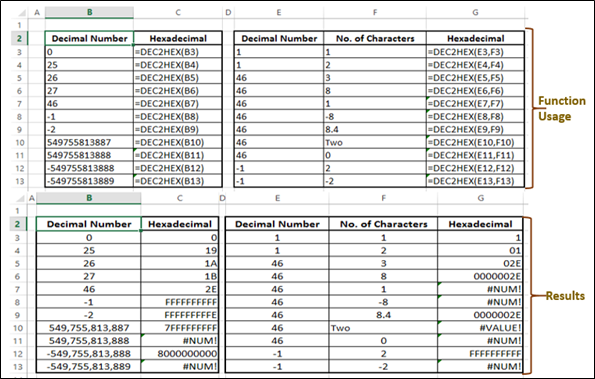
- Advanced Excel Functions Tutorial
- Advanced Excel Functions - Home
- Compatibility Functions
- Advanced Excel Functions - Cube
- Database Functions
- Date & Time Functions
- Engineering Functions
- Financial Functions
- Information Functions
- Advanced Excel Functions - Logical
- Lookup & Reference Functions
- Math & Trignometric Functions
- Statistical Functions
- Useful Resources
- Quick Guide
- Useful Resources
- Discussion
Engineering - DEC2HEX Function
Description
The DEC2HEX function converts a decimal number to hexadecimal.
Syntax
DEC2HEX (number, [places])
Arguments
| Argument | Description | Required/ Optional |
|---|---|---|
| number | The decimal integer you want to convert. If number is negative, places is ignored and DEC2HEX returns a 10-character (40-bit) hexadecimal number in which the most significant bit is the sign bit. The remaining 39 bits are magnitude bits. Negative numbers are represented using two's-complement notation. |
Required |
| places | The number of characters to use. If places is omitted, DEC2HEX uses the minimum number of characters necessary. Places is useful for padding the return value with leading 0s (zeros). |
Optional |
Notes
If Number is < -549,755,813,888 or if Number is > 549,755,813,887, DEC2HEX returns the #NUM! error value.
If Number is non-numeric, DEC2HEX returns the #VALUE! error value.
If the result of DEC2HEX requires more than the number of specified Places characters, it returns the #NUM! Error value. For example, DEC2HEX(64,1) returns the error value because the result (40) requires two characters.
If Places is not an integer, the value of Places is truncated.
If Places is non-numeric, DEC2HEX returns the #VALUE! error value.
If Places is negative, DEC2HEX returns the #NUM! error value.
Applicability
Excel 2007, Excel 2010, Excel 2013, Excel 2016
Example
